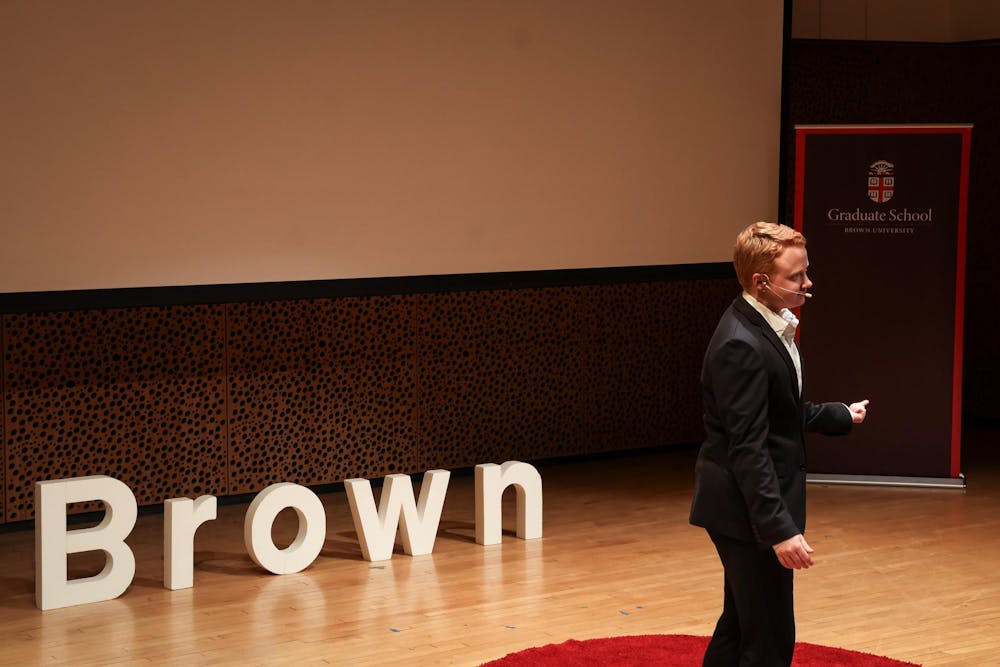On Thursday, the Graduate School hosted “Research Matters: Celebrating New Ideas and Discoveries,” spotlighting the intellectual exchange of graduate students.
The annual event, which began in 2014, aims to make Brown research accessible for an interdisciplinary audience. Dean of the School of Public Health Ashish Jha delivered a portion of the opening remarks, pointing to the integral role research plays amid federal threats to academia.
“Research — science, the scientific method, the ways we have done knowledge generation — is under attack,” Jha said in his speech. “The most important thing that we have to spend time on is communicating the value of what we do.”
The event featured 13 graduate students who each delivered five-minute presentations about their research in rapid succession in disciplines ranging from philosophy and Africana studies to public health and physics.
Melaine Ferdinand-King GS, who is in her final year as a PhD candidate in the Africana Studies department, investigates Afrosurrealism as a “method of articulating how Black people navigate a world that feels fundamentally surreal,” she said in an interview with The Herald.
Ferdinand-King argued in her talk, “Reimagining Cultural Frameworks: Afrosurrealism in Practice,” that “Black cultural studies frameworks, like Afrosurrealism, provide a kind of alternative scientific method where we use culture to ask different questions from different angles to come up with transformative solutions.”
Patrick McKee GS, a philosophy PhD candidate, presented on the welfare of artificial intelligence. McKee studies ethics that examine “whether non-conscious AIs can have moral status, and what, if anything, would be good for them,” the event’s program read.
In his presentation, “It’s Good to Have a Body, Even if You’re an AI,” McKee imagines a near future where AI models can have “lives that can go well or badly.” He argued that when that time comes, humans would have a moral obligation to give AI models bodies because “it’s bad to be disembodied and, conversely, good to have a body.”
The question of AI models having bodies “teaches us that our own lives are going well in a way that we may not notice simply because we do have bodies,” McKee said.
Nicole Giron GS, a PhD candidate in health services research, examined the role of safety net providers, such as community health centers, in serving low-income elderly patients in her talk, “Caring for an Aging Population in Community Health Centers.”
“There’s a growing population of low-income seniors,” Giron told The Herald. “So, understanding how health care providers that are plugged into our communities can serve this growing population is the focus of my work.”
Another PhD candidate in health services research, Gray Babbs GS, uses objective measures to show that transgender people receive worse quality of healthcare. In his talk, “Seeing Us,” Babbs revealed that providers with more experience with transgender patients show improved quality of care for those patients.
“Trans people deserve quality healthcare,” Babbs said. “And when providers see us, they begin to really see us.”
In his presentation titled “How Brain-Inspired Imaging Reveals Hidden Worlds,” Ning Zhang GS, a PhD candidate in engineering, discussed his research about the development of a brain-inspired optical imaging system that can see through hazy environments, like fog and smoke.
“The ability to turn invisible into visible has profound real-world applications,” Zhang said during his talk. “My research aims to push boundaries of what we can perceive to improve safety, healthcare and beyond.”
To earn a spot at the event, the speakers went through a nomination and application process, Assistant Dean of Student Development Byrd McDaniel told The Herald. McDaniel was an event coordinator and member of the selection panel. But of the many submissions, 20 students were invited to the semi-finals, where they presented their research to a selection panel that determined the final 13 speakers.
McDaniel said that there are two important categories in selecting speakers: the first is “comprehension and content,” and the second is “engagement and communication.”
“Our speakers may make it look easy,” wrote Senior Associate Dean of Student Development Vanessa Ryan, who organized the event, in an email to The Herald. “But stepping back from the vital minutiae of research and speaking to an interdisciplinary audience is a real challenge.”
According to McDaniel, “the word ‘research’ might mean something very different” to scholars of different disciplines. While Ferdinand-King investigated archival material and cultural artifacts such as collage, jazz, memoirs and poetry for her research, Giron investigated national data sets available at Brown to show the significance of health centers in a “quantitative way.”
Ryan wrote that “critical thinking, evidence-based dialogue and intellectual curiosity” — integral components of research — are “more vital than ever.”
“Events like this remind us why research matters,” Ryan added.





